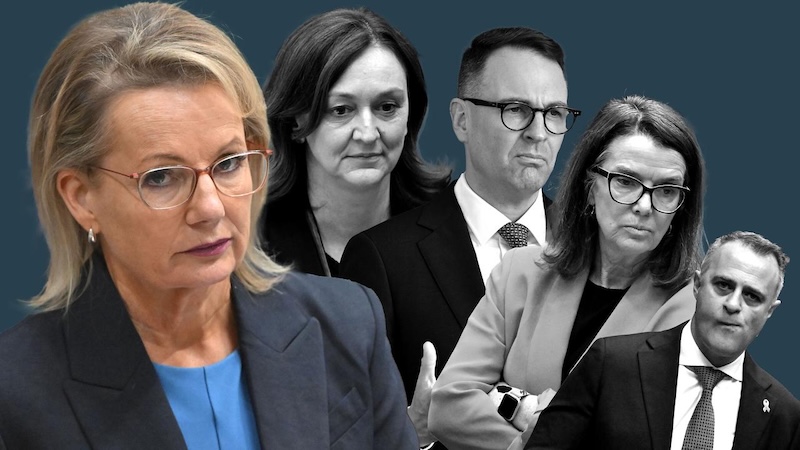
Mainstream reporting created the illusion that the Federal Liberal Party’s “Moderates” still mattered before the net-zero vote but Michael Pascoe says the faction was already deep in the endgame of a seven-year decline.
There’s been more coverage of the Coalition’s turmoil than there was of the Melbourne Cup but missing was the reality that the Liberal Moderates had been scratched before the race. The curtain had been drawn around them. It’s just a matter of the vet arriving to finish it.
Switching from equine to canine metaphors, I’ve written it before and it’s worth writing again: Queensland’s LNP is the Coalition dog, the Liberal Party is the tail, the “Moderates” merely fleas on the tail.
And last week the mongrel displayed a new anti-flea collar and gulped a double dose of NexGard, covering ticks and worms as well.
What’s been underplayed is just how few fleas there are left to deal with and how they’ve been jumping off the dog for seven years.
Fleas exit hound
Leaving aside the Queensland LNP hybrids, there are only two Moderates left with city seats. There’s Tim Wilson in Melbourne’s Goldstein and Julian Leeser in Sydney’s Berowra and even it has fair bit of bush in its northern end.
Wilson won back his seat by just 175 votes. Leeser suffered a near-six per cent swing, cutting his margin to 3.2 per cent. The LNP’s climate policy will do neither of them any favours at the next election.
There are arguably only three other Moderate MPs: Susan Ley, Mary Aldred and Melissa Price, all rural/regional.
The Moderates’ strength, to use the word loosely about what eight people can do, is in the Senate, the sheltered workshop for members who lost their House seats or would have little chance of winning one, where our duopoly politics deliver the party votes and Senators’ real election is their party pre-selection.
The eight – Dave Sharma, Maria Kovacic and Andrew Bragg from NSW; Anne Ruston, Kerrynne Liddle and (maybe) Andrew McLachlan SA; Richard Colbeck Tasmania; Jane Hume Victoria – have varying use-by dates. The persistence of the right and its financial backing plus moderate rank and file members deserting a party that no longer represents them does not bode well for future preselection battles.
To a large extent, they are a somewhat protected species thanks to the difficulty the community independents movement, the please-don’t-call-us-Teals, getting its act together to form the party structure necessary to run a Senate ticket.
That might not always be the case and, with or without Teal competition, a party dominated by the right could be expected to place Moderates in the less secure positions on Senate tickets.
In any event, it’s in the House of Reps where the leadership and any hopes of government reside. There the future looks LNP.
Queensland’s hybrid system of LNP members subsequently choosing to identify as Liberal or National when they get to Canberra makes sense for the remnants of a Liberal Party whose policy is set by the Nationals anyway.
The two or three nominally “moderate” LNP members identifying as Liberals have more in common with National LNP members like Littleproud and Canavan than Julian Leeser and Tim Wilson.
A single conservative identity?
On the trajectory both parties are on, a federal LNP will increasingly appeal, eventually a single conservative identity.
And what happens to the moderate remnants? With the possible exception of Julian Leeser who could do an Andrew Gee and perhaps retain his seat as an independent, they would fold as they always do to keep their jobs as long as possible.
It’s the inevitable end to a process that started with Malcolm Turnbull losing the Prime Ministership in 2018. That’s when the moderates quit.
As a political force, the moderates had already left the building before the Teal revolution.
To plagiarise a piece I wrote before the 2022 election:
The moderate leadership quit between the 2016 and 2019 elections, leaving those remaining powerless.
Those eight included the leader and deputy leader of the party, the field vacated to the “Morrison club/centre right” and Peter Dutton’s “national right”.
And there are more liberal Liberals not contesting this month’s election – John Alexander, Scott Ryan and Tony Smith.
The Sydney Morning Herald was euphemistic when it described the three most “influential” moderates – Simon Birmingham, Marise Payne and Paul Fletcher – as being “cut from similar cloth and … quieter personalities than their factional predecessors Christopher Pyne, Julie Bishop and George Brandis”.
Whatever their personalities, their quietness represents weakness to the point of irrelevance.
And those three “most influential moderates” all quit before this year’s election, leaving the present fleas.
It’s hard to see Leeser sticking with this Liberal Party much longer once it gets around to dumping Sussan Ley as leader and would Sussan stay on after being dumped or do a Malcolm?
The others, well, they’re moderates. They have their jobs to consider.
Andrew Bragg provides a good example of moderate spine. He said he would quit the frontbench if net zero was dumped. It was dumped. As far as I’ve heard, he hasn’t quit.